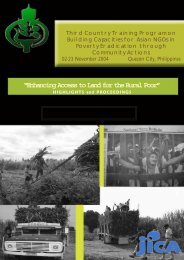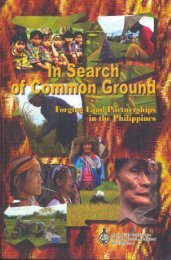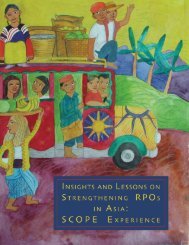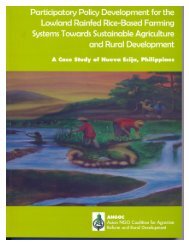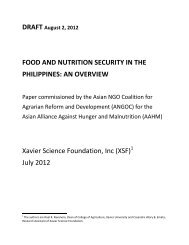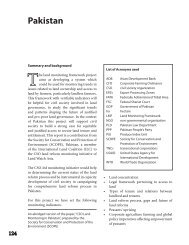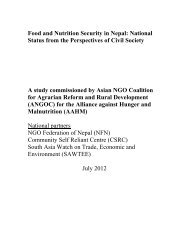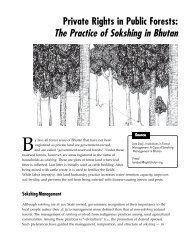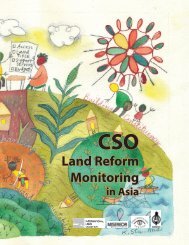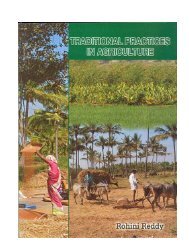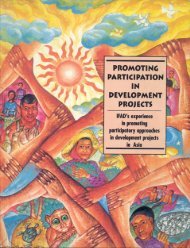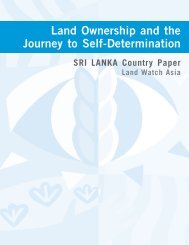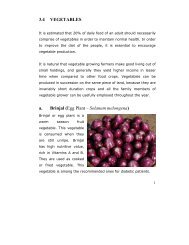Securing the Right to Land FULL - ANGOC
Securing the Right to Land FULL - ANGOC
Securing the Right to Land FULL - ANGOC
You also want an ePaper? Increase the reach of your titles
YUMPU automatically turns print PDFs into web optimized ePapers that Google loves.
cases involving fisherfolk. Media, both local and national, have<br />
also been supportive of fisherfolk issues.<br />
A noteworthy initiative is Gawad Kalinga (GK), which employs a<br />
simple strategy of providing land for <strong>the</strong> landless, homes for <strong>the</strong><br />
homeless, food for <strong>the</strong> hungry and as a result providing dignity<br />
and peace for every Filipino. While not focused exclusively on<br />
small fisherfolk, a number of Gawad Kalinga projects in Ba<strong>to</strong>,<br />
Leyte, Ozamiz, Misamis Occidental and Balangkayan, and Eastern<br />
Samar have successfully addressed <strong>the</strong> settlement needs of municipal<br />
fishers in <strong>the</strong>se areas. It may be appropriate <strong>to</strong> establish a<br />
more formal collaboration between GK and fisherfolk groups.<br />
Fisherfolk have not been as fortunate with LGUs. In general,<br />
cooperation between <strong>the</strong>m has not been productive. However,<br />
<strong>the</strong>re are notable exceptions, e.g., in Quezon, Davao Oriental<br />
and Zambales, where mechanisms for consultation and dialogue<br />
have facilitated <strong>the</strong> identification of fisherfolk settlement<br />
sites for inclusion in <strong>the</strong> municipal CLUP.<br />
In 2006, NFR, <strong>to</strong>ge<strong>the</strong>r with fisherfolk representatives from<br />
Luzon, Visayas and Mindanao, reviewed <strong>the</strong> Fisheries Code. The<br />
review identified seven <strong>the</strong>mes in fisheries, one of <strong>the</strong>m being<br />
Fisherfolk <strong>Right</strong>s and Settlements. This was in response <strong>to</strong> <strong>the</strong><br />
increasing number of reports from fishers of court-decreed displacement<br />
and eviction. To address this concern, NFR came out<br />
with three documents declaring its support for fisherfolk settlements.<br />
The first is a Joint Administrative Order (JAO) outlining<br />
<strong>the</strong> process for identification and selection of fishers-beneficiaries<br />
and disposability of lands through different modes. The second<br />
document is a draft special order for DENR <strong>to</strong> identify lands<br />
of <strong>the</strong> public domain near <strong>the</strong> sea that are suitable for settlements<br />
(this has been adopted by DENR as a Special Order entitled<br />
“Identification of Public <strong>Land</strong>s Suitable For Fisherfolk<br />
Settlements in Coastal Municipalities and Cities.”) The third NFR<br />
document is a proposed municipal ordinance ordering coastal<br />
cities and municipalities <strong>to</strong> identify, acquire, and distribute areas<br />
for fisherfolk settlement.<br />
Innovations in Promoting<br />
Access <strong>to</strong> <strong>Land</strong> and Tenurial<br />
Security<br />
Approaches <strong>to</strong> access/tenurial security that hold <strong>the</strong> most promise<br />
are those that integrate <strong>the</strong> concerns of tenurial security, live-<br />
DEFENDING THE GAINS OF TENURIAL REFORM<br />
147<br />
lihood, resource management and community empowerment. To<br />
some extent, integrated, tenure-based resource management is<br />
already embodied in progressive legislation such as IPRA and <strong>the</strong><br />
Fisheries Code. In part, <strong>the</strong>se community-based, integrated approaches<br />
evolved from experiments by NGOs, people’s organizations<br />
(POs), and reformers in government.<br />
Agrarian Reform<br />
TriPARRD<br />
The Tripartite Partnership in Agrarian Reform and Rural Development<br />
(TriPARRD) program of <strong>the</strong> Philippine Partnership for <strong>the</strong><br />
Development of Human Resources in Rural Areas (PhilDHRRA),<br />
a rural development NGO network, utilized a tripartite approach<br />
(cooperation among government, NGO, and farmer’s organizations)<br />
<strong>to</strong> promote land tenure improvement, social infrastructure<br />
building and agricultural productivity enhancement. The<br />
“tripartite approach” as well as many TriPARRD technologies (for<br />
instance, on land distribution tracking) have since been institutionalized<br />
at <strong>the</strong> DAR (Delos Reyes & Jopillo, 1994).<br />
Agrarian Reform Communities Development Project<br />
(ARCDP) 11<br />
The government, through DAR, launched <strong>the</strong> ARC approach <strong>to</strong><br />
beneficiary development in 1993. The ARC approach involves<br />
<strong>the</strong> provision of support services, specifically basic social infrastructure,<br />
like water, power supply, education and health, for<br />
ARB communities living in <strong>the</strong> same or adjacent barangays,<br />
ra<strong>the</strong>r than attempting <strong>to</strong> service all areas covered by CARP.<br />
The second phase of <strong>the</strong> ARCDP, implemented from 2003–<br />
2007, focused on <strong>the</strong> following interventions: (i) community<br />
development and capacity building; (ii) rural infrastructure development;<br />
(iii) agriculture and enterprise development; and (iv)<br />
financing support.<br />
Farmer Paralegalism<br />
Paralegalism involves educating farmers on <strong>the</strong> laws that affect<br />
<strong>the</strong>ir rights. It also includes training on handling legal cases and<br />
networking with o<strong>the</strong>r advocates. One such paralegal program<br />
is Paralegal Education, Skills Advancement and Networking<br />
Technology (PESANTech). The project aims <strong>to</strong> improve <strong>the</strong> resource<br />
tenure of communities through empowered community<br />
based legal resource institutions. PESANTech was implemented<br />
by SALIGAN, KAISAHAN and BALAOD–Mindanaw. From 1993 <strong>to</strong><br />
2006, <strong>the</strong> program covered 21 provinces nationwide.<br />
ASIAN NGO COALITION FOR AGRARIAN REFORM AND RURAL DEVELOPMENT



